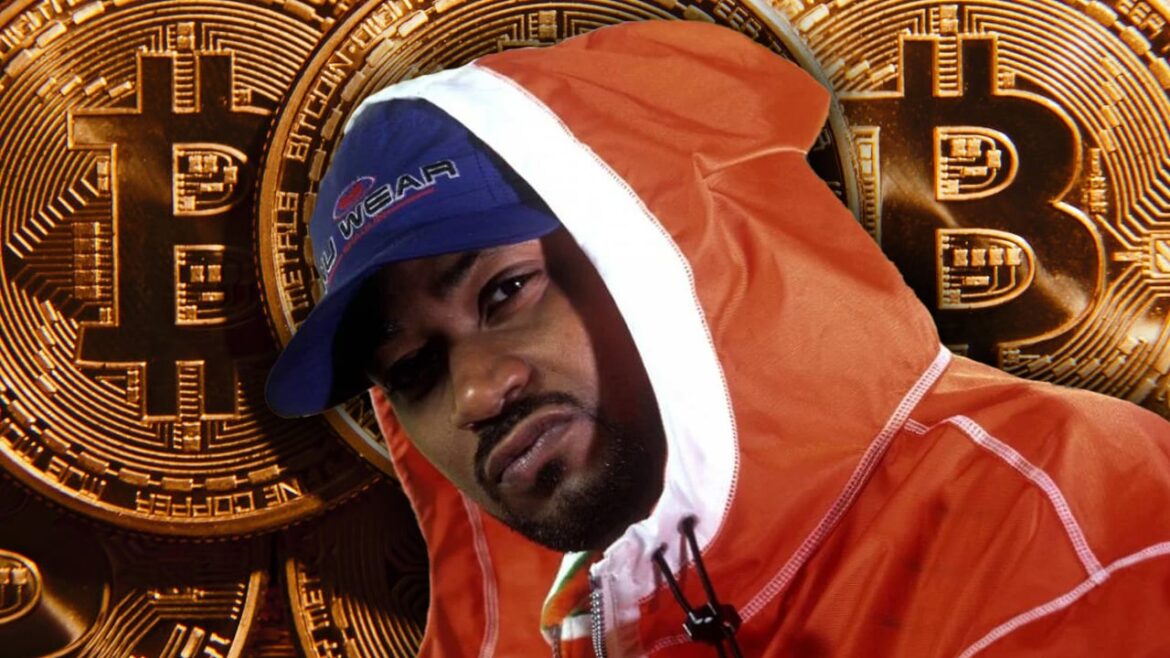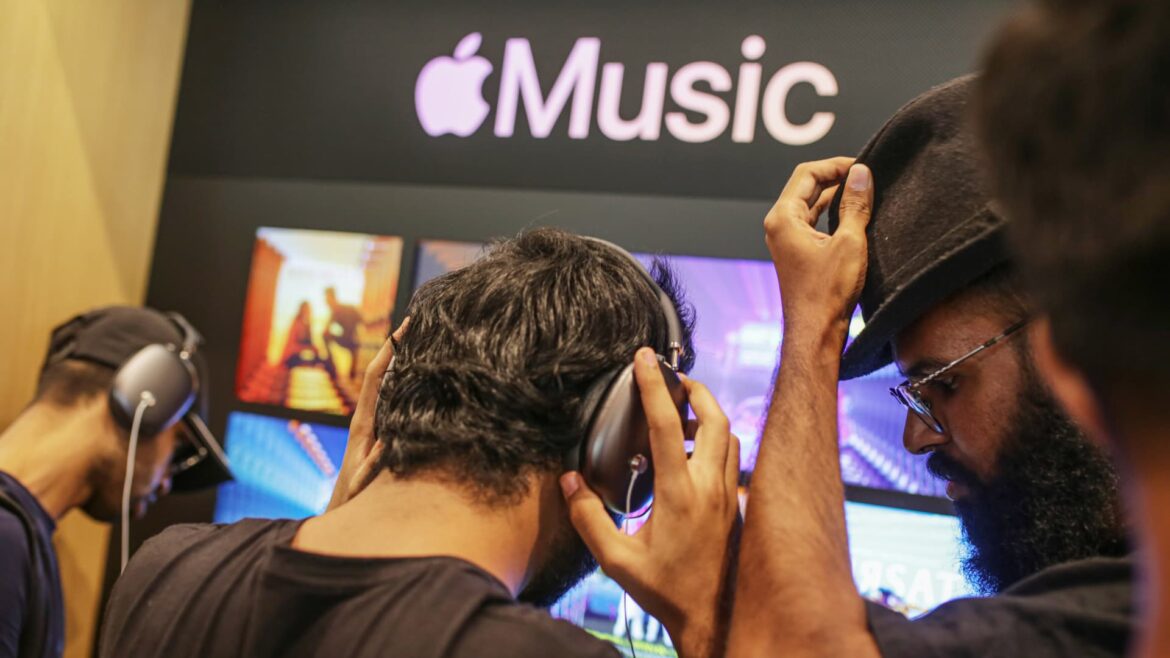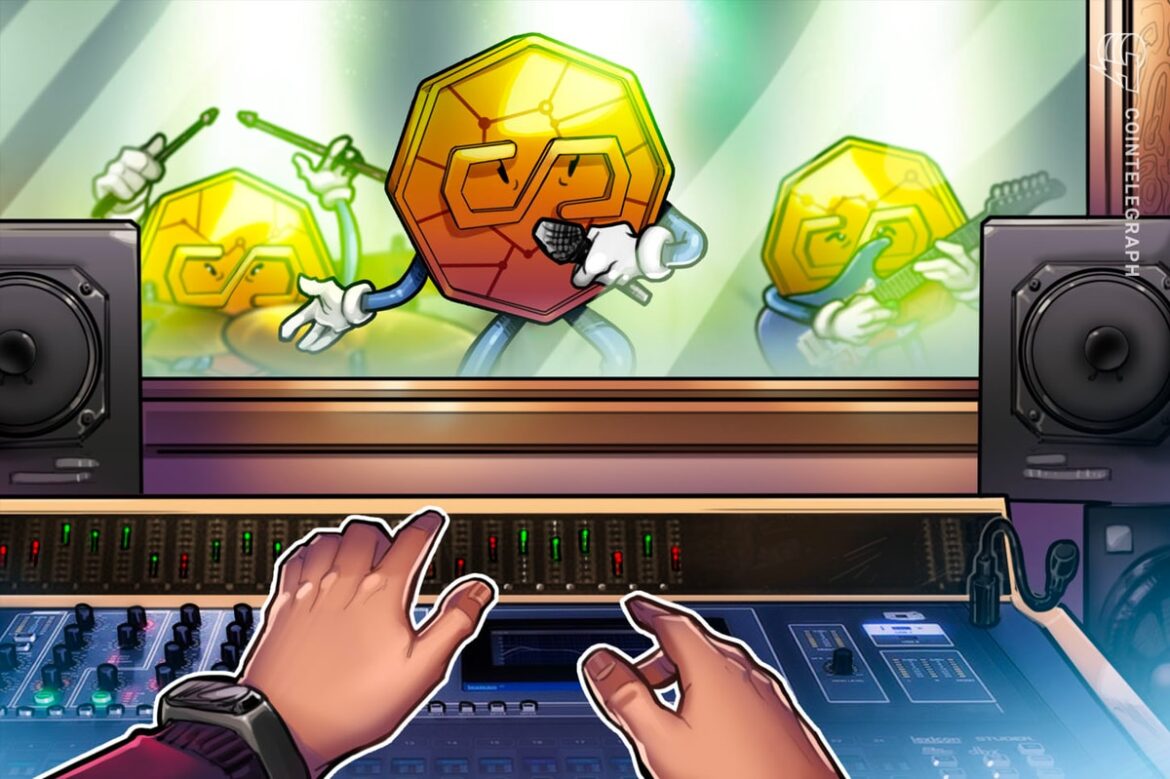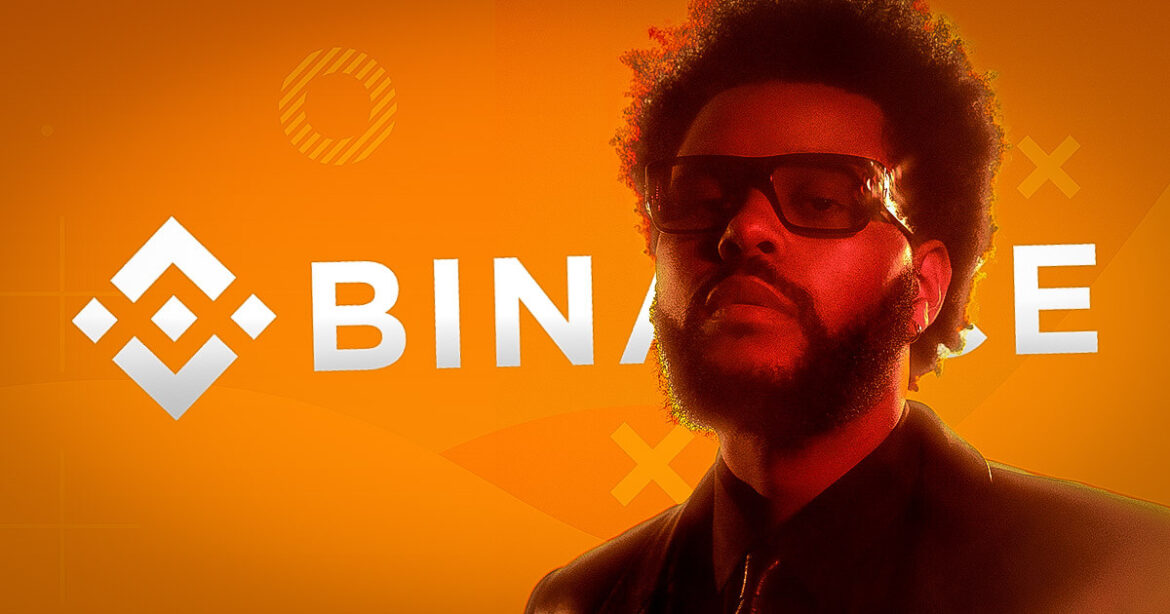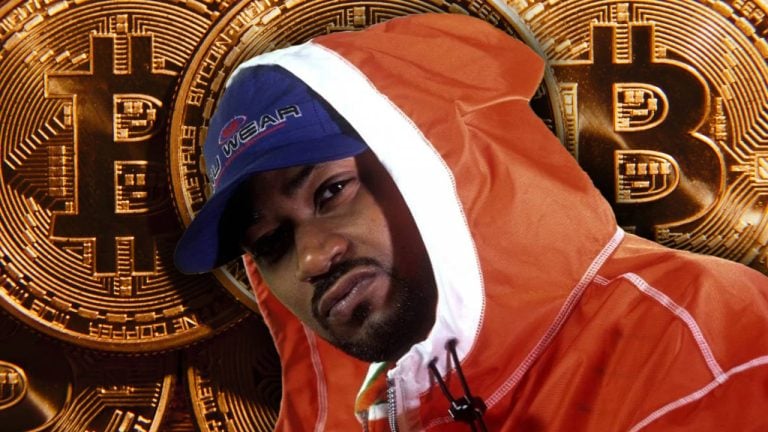 This week, the popular American rapper and Wu-Tang Clan member, Ghostface Killah, declared his intention to release exclusive tracks on the Bitcoin blockchain. The influential hip-hop artist mentioned that this issuance will encompass a 10,000-piece collection, granting owners the rights to the music. Ghostface Killah Innovates With Bitcoin-Backed Music Rights Collection Tracks produced by Wu-Tang […]
This week, the popular American rapper and Wu-Tang Clan member, Ghostface Killah, declared his intention to release exclusive tracks on the Bitcoin blockchain. The influential hip-hop artist mentioned that this issuance will encompass a 10,000-piece collection, granting owners the rights to the music. Ghostface Killah Innovates With Bitcoin-Backed Music Rights Collection Tracks produced by Wu-Tang […]
Source link
Music
Apple hit with more than $1.95 billion EU antitrust fine over music streaming

The European Commission, the European Union’s executive arm, on Monday hit Apple with a 1.8 billion euro ($1.95 billion) antitrust fine for abusing its dominant position in the market for the distribution of music streaming apps.
The commission said it found that Apple had applied restrictions on app developers that prevented them from informing iOS users about alternative and cheaper music subscription services available outside of the app.
Apple also banned developers of music streaming apps from providing any instructions about how users could subscribe to these cheaper offers, the commission alleged.
This is Apple’s first antitrust fine from Brussels and is one of the biggest dished out to a technology company by the EU.
Apple shares were down around 2.5% in morning trading in the U.S.
The European Commission opened an investigation into Apple after a complaint from Spotify in 2019. The probe was narrowed down to focus on contractual restrictions that Apple imposed on app developers which prevent them from informing iPhone and iPad users of alternative music subscription services at lower prices outside of the App Store.
Apple’s conduct lasted almost 10 years, according to the commission, and “may have led many iOS users to pay significantly higher prices for music streaming subscriptions because of the high commission fee imposed by Apple on developers and passed on to consumers in the form of higher subscription prices for the same service on the Apple App Store.”
Apple response
In a fiery response to the fine, Apple said Spotify would stand to gain the most from the EU pronouncement.
“The primary advocate for this decision — and the biggest beneficiary — is Spotify, a company based in Stockholm, Sweden. Spotify has the largest music streaming app in the world, and has met with the European Commission more than 65 times during this investigation,” Apple said in a statement.
“Today, Spotify has a 56 percent share of Europe’s music streaming market — more than double their closest competitor’s — and pays Apple nothing for the services that have helped make them one of the most recognisable brands in the world.”
Apple said that a “large part” of Spotify’s success is thanks to the Cupertino, California-based giant’s App Store, “along with all the tools and technology that Spotify uses to build, update, and share their app with Apple users around the world.”
Apple said that Spotify pays it nothing. That’s because instead of selling subscriptions in its iOS app, Spotify sells them via its own website. Apple does not collect a commission on those purchases.
Developers over the years have spoken out against the 30% fee Apple charges on in-app purchases.
Spotify in a statement called the commission’s decision “an important moment in the fight for a more open internet for consumers.”
“Apple’s rules muzzled Spotify and other music streaming services from sharing with our users directly in our app about various benefits—denying us the ability to communicate with them about how to upgrade and the price of subscriptions, promotions, discounts, or numerous other perks,” Spotify said.
“Of course, Apple Music, a competitor to these apps, is not barred from the same behaviour.”
Apple fine just a ‘parking ticket’
The commission said Apple prevented developers of music streaming apps from informing their iOS users within their apps about prices of subscriptions or offers available elsewhere.
App developers could not include links in their apps leading iOS users to the app developers’ websites where alternative subscription could be bought, the commission alleges.
The EU’s executive arm also said Apple prevented app developers from contacting their own newly acquired users — for example via email — to inform them about alternative pricing options.
In a press briefing, EU antitrust chief Margrethe Vestager qualified the basic amount of the fine for Apple, excluding the 1.8 billion euro lump sum, as “quite small” and likened it to a “speeding ticket, or a parking ticket” relative to the company’s scale.
“When Apple imposes these anti-steering provisions on the music provider, they as developers have no other choice than to either accept them or abandon the App store. Apple with its App Store currently holds a monopoly,” Vestager said.
She added the commission has ordered Apple to remove the so-called anti-steering provisions and to “refrain from similar practices in the future.”
EU scrutiny on tech giants rises
The fine will ramp up tensions between Big Tech and Brussels at a time when the EU is increasing scrutiny of these firms.
Last year, the commission designated Apple among other tech firms like Microsoft and Meta as “gatekeepers” under a landmark regulation called the Digital Markets Act, which broadly came into effect last year.
The term gatekeepers refers to massive internet platforms which the EU believes are restricting access to core platform services, such as online search, advertising, and messaging and communications.
The Digital Markets Act aims to clamp down on anti-competitive practices from tech players, and force them to open out some of their services to other competitors. Smaller internet firms and other businesses have complained about being hurt by these companies’ business practices.
These laws have already had an impact on Apple. The company announced plans this year to open up its iPhone and iPad to alternative app stores other than its own. Developers have long complained about the 30% fee Apple charges on in-app purchases.
Vestager fired a warning shot to Apple in regard to the DMA.
“In a couple of days on the 7th of March, Apple will have to comply with the full list of dos and don’ts under the DMA. Among others, Apple can no longer impose rules such as the anti-steering obligations … and this holds for any app on the App Store, not just music streaming apps.”
— CNBC’s Ryan Browne and Ruxandra Iordache contributed to this article.
The Beatles released what they’re calling their “last song” on Nov. 2, featuring vocal tracks of the late John Lennon developed with the assistance of artificial intelligence (AI).
“Now and Then” was released by Universal Music Group, one of the world’s leading music companies, and was accompanied by a short documentary detailing how the track was created using new technologies.
The video explains how director Peter Jackson developed software while working on his comprehensive Beatles documentary, “Get Back,” that allowed the team to uncouple Lennon’s vocals from his piano part in the original cassette tape recording of “Now and Then” from the late 1970s that he initially made as a demo.
“[We developed] a technology which allows us to take any soundtrack and split all the different components into separate tracks based on machine learning.”
In a separate interview, the track’s co-producer Giles Martin explained that AI can be taught to recognize voices:
“So if you and I have a conversation and we’re in a crowded room and there’s a piano playing in the background, we can teach the AI what the sound of your voice, the sound of my voice, and it can extract those voices.”
Paul McCartney, one of the four original Beatles members, said that after they heard of Jackson’s new technology, they “better send John’s voice to them off the original cassette.”
Thus, the new track got off the ground with a little help from AI. John Lennon’s son Sean Ono Lennon commented in the video that his dad “would’ve loved that because he was never shy to experiment with recording technology.”
Related: AI music sending traditional industry into ‘panic,’ says new AI music platform CEO
McCartney echoed the sentiment, saying:
“To still be working on Beatles music in 2023… wow. We’re actually messing around with state-of-the-art technology, which is something the Beatles would’ve been very interested in.”
Along with John Lennon, the track features the two remaining members of the Beatles — McCartney and Ringo Starr — and the late George Harrison.
In response to McCartney’s post on X (formerly Twitter), fans called the new track “beautiful” and a “work of art and perfect way to end the discography.” One fan even said they hope AI will help make a “Beatles live hologram concert on stage” for those who missed the opportunity to see them live.
However, there has already been mumbling from others about the use of AI and the “fake” Beatles song.
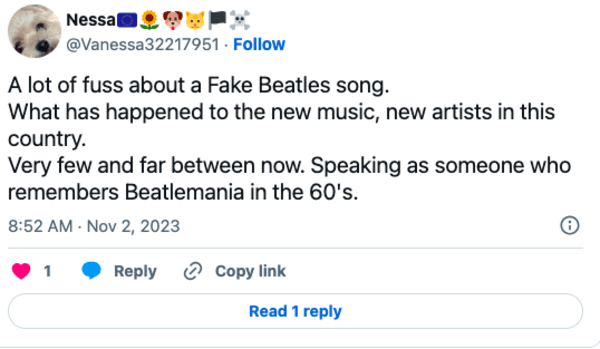
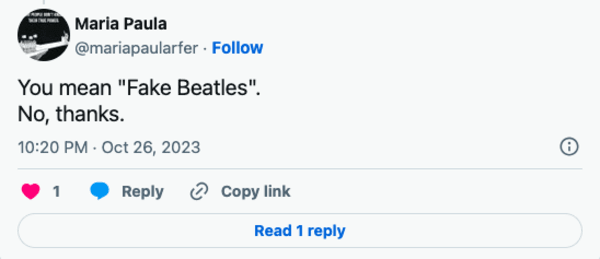
In a recent survey of musicians conducted by music studio house Pirate, 53% of respondents said they have “concerns about how their audience might perceive music created with the assistance of AI.”
The survey also inquired into why musicians were reluctant to use AI, with 58% reporting that “loss of authenticity” was the primary concern.
Magazine: BitCulture: Fine art on Solana, AI music, podcast + book reviews
Singer Vérité’s fan-first approach to Web3, music NFTs and community building – Cointelegraph Magazine
Carving out a sustainable career as an independent musician is no easy feat. The competition is fierce, support can be hard to find, and earning a living without the financial help of a major record label is an uphill battle. Yet, for those who are able to build a loyal fanbase, the freedom of complete creative control can be liberating.
Technology has long proven to be a potential friend to those musicians willing to embrace it, and nonfungible tokens are the latest innovation that many tech-savvy artists have begun incorporating into their careers. But NFTs remain both controversial and experimental, especially among the mainstream, and music NFTs are still relatively niche.
One artist who has cracked the code to maintaining a successful career as an independent musician is American singer Vérité, who has racked up hundreds of millions of streams without the support of a record label since releasing her first single, “Strange Enough,” in 2014.
was about to sign to a major label. they backed out last minute. now i’m an independent artist with 200 million+ streams, own my masters & publishing, create & release whatever the fuck i want & run my own business. rejection is always for a reason. #ShareYourRejections
— VÉRITÉ (@Verite) August 17, 2018
After finding success and touring internationally, Vérité became one of the earliest musicians to experiment with NFTs in February 2021. Since then, she has built a strong Web3 community and had several successful high-profile drops, including releasing 1/1 NFTs, selling the master rights to her music, fractionalizing song royalties on the blockchain and giving NFTs to concert attendees. She has done all this while still retaining her dedicated non-Web3 fans, many of whom have little to no interest in crypto.
How does one walk this fine line and successfully integrate Web3 into their career without alienating their existing, perhaps skeptical, fans? Magazine sits down with Vérité to find out.
Don’t over-rely on Web3
For many musicians, Web3 is an exciting frontier filled with new possibilities for fan engagement and revenue generation. However, Vérité believes it is important that artists have diversified revenue streams and marketing strategies and don’t fall into the trap of assuming that the hype surrounding anything, especially NFTs, will last forever.

Building a music career in Web3 is “a bit of a double-edged sword,” Vérité tells Magazine. While it can help bring people together, “it becomes a negative when maybe artists limit themselves to only utilizing those tools and only existing within those communities, not really having the foresight that there was a hype cycle that then broke and these paths to monetization closed.”
“My focus is ‘How do I build a career that can withstand trend cycles, that can refocus on the foundation of my career while trying to push forward to build better?’ because we recognize that a lot of these systems are extremely broken.”
Protect and respect fans
Not every fan wants to join their favorite artist on their Web3 journey, and that’s fine, according to Vérité. When she first started releasing NFTs, she heavily emphasized that she was simply experimenting with the technology. “I was very, very clear that I don’t care if you come with me on this experiment — this is an experiment for me,” she states.
Read also
Features
Thailand’s Crypto Utopia — ‘90% of a cult, without all the weird stuff’
Features
Reformed ‘altcoin slayer’ Eric Wall on shitposting and scaling Ethereum
Vérité actually took it one step further, actively encouraging fans not to join her. “A lot of my communication with them was, ‘Don’t buy this. Don’t participate unless you are fully educated and willing to fully educate yourself and take on the risks.’” Even now, she still tells her fans that they should never feel pressured to participate in anything Web3-related.
Web3 has a scalability problem. It doesn’t resonate with non crypto native audiences. Sentiments are vitriol, skepticism, distrust & lack of interest.. We are building solutions that audiences aren’t asking for in hopes to create better monetization structures for artists.
— VÉRITÉ (@Verite) March 15, 2023
“More than monetizing, it’s really protecting the people who have supported my career for the last eight years,” Vérité emphasizes.
It’s clear that not everyone is sold on the power and potential of blockchain. The bear market certainly hasn’t helped the space’s reputation either, with the collapse of crypto exchange FTX making mainstream media headlines and the prices of even blue-chip NFTs crashing 95% from their bull market peaks.
“If you go on my Discord — and I do tag everyone and say, ‘What do you think about crypto and NFTs?’ — people are not jazzed. Most of them, honestly. It’s just general disinterest,” Vérité explains. But it’s not necessarily that her fans actively hate crypto. “I’m finding that people don’t have a desire to do something new because they don’t see a problem, right?”


According to the singer, “NFTs, Web3, how it’s been marketed out to the masses is also wholly unpalatable really to non-tech-native fans.” Instead, she offers the following advice:
“I would more so recommend people to frame it as utilizing tools because it’s a weird market, and it’s hard to justify some of the scams and the negative aspects that can cause real harm to someone who isn’t knowledgeable or educated on those things.”
Offer an option, not a requirement
Instead of forcing fans to join her on-chain, Vérité instead focuses on building experiences with a Web3 element that is present but optional. She describes her approach as offering a “door” for fans to enter, one where blockchain functionalities can be unlocked to further enhance the fan experience — but where fans will still enjoy the experience regardless of whether they open the door:
“Do you need to jump the technological hurdle in order to have the experience, right? Or is it just a door? If it’s a door, you can talk about it because it’s not a burden.”
“For me, it’s really trying to consider, ‘What is the experience that we’re offering, what are the actual viable use cases of blockchain technology that we can tack on that aren’t burdensome?’” she says.
One example is “The Vérité Crewneck,” a tech-enabled sweatshirt the singer dropped in late 2022 in collaboration with IYK, a company working with brands, artists and creators to develop phygital experiences. The sweatshirt has a near-field communication, or NFC, chip embedded in the sleeve, which can be scanned to access exclusive content and unlock an NFT representing a certificate of authenticity.

Vérité explains that fans who bought the sweatshirt received “premier access to the next era of my records.” Buyers could scan the chip with their phones and get early access to music and perks such as behind-the-scenes content. “That was the main value proposition — not a Web3 activation, right?”
But the landing page also features an option to verify the garment, through which curious fans can receive their NFT.
Fans are at the center of it all
Between straight-up telling fans not to purchase her NFTs to offering them experiences where the Web3 option is an added bonus, Vérité’s fan-centric approach has undoubtedly played a significant role in her ability to push boundaries — and see success — in Web3 while still maintaining a loyal non-Web3 fanbase. Or, in her words, “My fans come first, and I don’t have fans just so that I can sell them shit all the time.”
Regarding her long-term hope for the future of blockchain and music, Vérité says her vision is that “we can demystify the black box of data that exists between artists and their fans, that is held by social platforms, ticketing companies, etc., and that blockchain actually does have the ability to make that information transparent so that artists can communicate directly to the people who support them and reward them in long-term scenarios.”
If the hype is to be believed, this dream may one day come true. But based on Vérité’s experience at the forefront of it all, it seems the only way the music-Web3 revolution will be truly successful is if fans are placed at the center of it.
Subscribe
The most engaging reads in blockchain. Delivered once a
week.


Jonathan DeYoung
Jonathan DeYoung is the senior copy editor at Cointelegraph and co-host of The Agenda podcast. He is interested in how decentralized technologies can strengthen communities, and the ways blockchain can empower independent artists and creators. In his free time, Jonathan raps and produces under the name “MADic.”
AI music sending traditional industry into ‘panic,’ says new AI music platform CEO
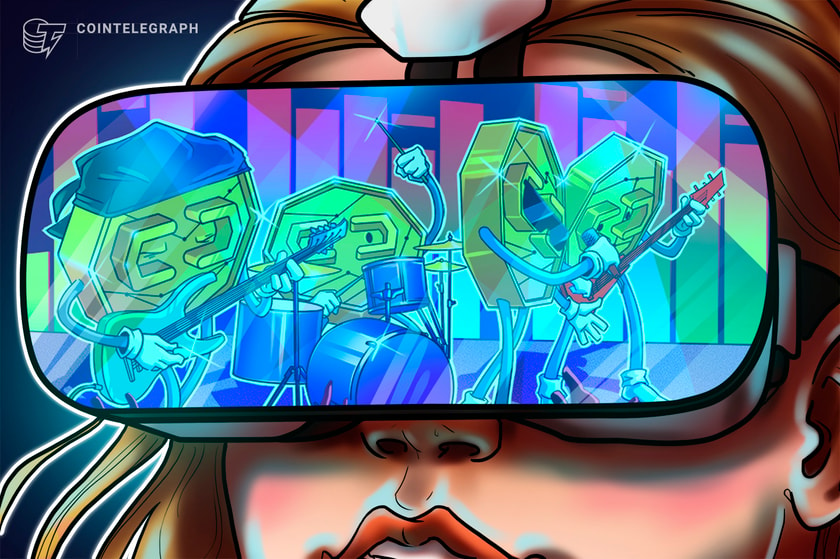
Artificial intelligence (AI) has been making waves in various industries across the globe. However, the conflict between its usefulness and its ability to infringe on intellectual property (IP) has been a particular struggle in the creative industries.
Major players in the music industry, from artists and record labels to institutions like the Grammys and YouTube, have all had to factor in AI in some form.
As traditional spaces in the music industry deal with technology, new platforms are popping up that embrace the technology from the start are popping up. Musixy launched on Sept. 14 to serve as a streaming platform, label and marketplace for music exclusively generated by AI.
Cointelegraph spoke with Can Ansay, founder and CEO of Musixy, to better understand how giving AI-generated music its own space could shape the future music industry.
Musixy aims to become the “Spotify for AI hit songs,” particularly those that have been banned from other platforms. Over the last year, Spotify and other major streaming platforms have become more vigilant since Universal Music Group sent out an email asking them to step up their policing of copyrighted AI tracks.
Ansay said “the establishment,” or major labels, is in panic mode again, “as it was back then with Napster because they fear revenue losses due to a new disruptive technology.”
“Unlike back then, the AI revolution is not only perfectly legal but even threatens the existence of record companies. Music is not only produced much more efficiently but also cheaper.”
He said AI presents “talented producers” with the ability to produce and monetize a hit song with any famous voice in any language. Musixy particularly emphasizes the creation of new and covered hit songs with AI-generated vocals of well-known artists.
Related: AI-generated music challenges “efficiency” and “cost” of traditional labels, music exec.
Musixy also works with Ghostwriter, who produced a viral song with AI-generated vocal tracks of artists Drake and the Weeknd called “Heart on My Sleeve.”
The song was initially said to be eligible for a Grammy, though the CEO of the Recording Academy later clarified that it wasn’t eligible for nomination, highlighting that it was taken down from commercial streaming platforms and never received permission from the artists or labels to use their vocal likenesses.
Ansay said thatif Musixy is recognized as a streaming platform by the Recording Academy:
“For the first time, these amazing AI-assisted songs could rightfully win the Grammy recognition they deserve, produced with the help of AI.”
“This is especially true for those songs that unofficially use the vocals of famous singers with the help of AI that were arbitrarily banned from all other recognized streaming platforms,” he continued.
Ansay argued that from a legal perspective, vocal likeness is not “protectable,” as it would violate professional ethics and make it difficult for singers with a voice similar to another, more famous voice to work.
Instead, he suggested that AI vocal tracks should be marked as “unofficial” to avoid confusion.
Google and Universal Music Group were reportedly in recent negotiations over a tool that would allow AI tracks to be created using artists’ likenesses in a legal way.
When asked whether AI-generated music should compete on the same level as non-AI-generated music in terms of awards and recognition or have its own playing field, Ansay said both directions could be viable.
“For that to happen, one must legitimately, legally, and arguably under the rules of the Grammys, distinguish what tasks AI is used for in music production and to what degree.”
Otherwise, he believes a new category should be created, such as “AI Song of the Year,” or something similar. “According to the Grammys’ mission statement on their website,” he argued, “they also want to recognize excellence in ‘science.’”
Magazine: Tokenizing music royalties as NFTs could help the next Taylor Swift
Binance and The Weeknd mix music, crypto, and philanthropy in upcoming tour
Crypto exchange Binance is sponsoring The Weeknd’s “After Hours Til Dawn” tour in Australia and New Zealand later this year, according to an Aug. 22 statement shared with CryptoSlate. This leg of the tour is planned for November and December and is geared to enhance the fan experience by integrating novel web3 technologies.
Binance users to enjoy exclusives perks
Binance users in Australia and New Zealand will enjoy exclusive perks during the tour. Participants in the tour will receive limited-edition Souvenir NFTs (SNFTs), which grant them access to exclusive privileges, including The Weeknd’s concert and autographed merchandise, among other benefits.
In addition to SNFTs, Binance has exciting plans to launch an exclusive NFT collection in collaboration with The Weeknd later this year. This collection will showcase distinctive artworks that provide holders with a range of exclusive benefits upon availability.
Through digital innovation, Binance’s collaboration with The Weeknd aims to bridge the gap between creative artists and their fans. The Enter The Dimension platform offers users an immersive experience connecting with The Weeknd and presents opportunities to win concert tickets and exclusive merchandise.
Rachel Conlan, Binance VP of Global Marketing, said collaborating with the musician would help “unlock the power of Web3 and champion special fan experiences.” She added that the partnership would also show how crypto and blockchain technology can improve the entertainment industry.
Since the event began last year, the tour has engaged around three million fans across North America and Europe. The event had also seen active participation from the Binance community, with more than 30,000 fans joining the tour’s online challenge, while around 15,000 users also claimed SNFTs from the tour.
Philanthropic gesture
While the tour emphasizes the value of crypto and blockchain technology in the entertainment industry, it also carries a philanthropic gesture as the organizers have teamed up with The United Nations World Food Programme.
Binance said it had previously donated $2 million to the World Food Program’s XO Humanitarian Fund. Additionally, the exchange revealed intentions to allocate 5% of the proceeds from the Tour’s NFT Collection to support the program.
The post Binance and The Weeknd mix music, crypto, and philanthropy in upcoming tour appeared first on CryptoSlate.
Universal Music and Google in talks over deal to combat AI deep fakes: Report

Universal Music Group — one of the world’s leading music companies — and Google are in negotiations to license melodies and vocal tracks of artists to be used in songs generated by artificial intelligence (AI), according to a report from the Financial Times.
The talks have been confirmed by what the FT reports are “four people familiar with the matter.” The companies are reportedly aiming to create a partnership between the music industry and Big Tech in order to manage the rampant emergence of AI-generated deep fakes.
Mainstream AI usage has sparked concern among major music industry leaders due to the amount of “deep fakes” using musicians’ likenesses. Clips of AI-generated Drake and Kanye West began to go viral around April. Many have since been taken down.
The fact that this AI generated audio of Kanye West doing a cover of Drake’s “Hold On, We’re Going Home” sounds just like the real Kanye is scary and exciting.
The scary part: AI will never be this worst again.
Exciting part: this could unlock new doors of creativity. pic.twitter.com/u5RfmpKTcT
— Aliou Sidibe (@heyaliou) March 31, 2023
Reportedly, the discussions between the two industry giants are still in the early stages, with no impending product launch or guidelines. However, the FT sources say the goal is to develop a tool for creating tracks legally with copyrights rightly attributed.
The sources said that artists would have the right to opt in for their voices and music to be used. Another source claimed that Warner Music Group (WMG) has also been in conversation with Google regarding a similar product.
Cointelegraph reached out to WMG for further information but has not received a response.
Related: Music with AI elements can win a Grammy, Recording Academy CEO says
In April, Universal Music Group asked streaming services like Spotify to remove all AI-generated content due to copyright infringement.
A few weeks later, Spotify said it was ramping up policing of the platform and began actively taking down content in violation.
However, some artists are fully on board with their voices being used in AI-generated music. Grimes said she’s eager to be a “guinea pig” for this type of content and will split royalties 50/50 with the creators.
She also created Elf Tech, alongside a team of developers, which is her own voice simulation program available for public use.
Google and Meta have recently launched their own tools called Music LM and AudioCraft to create music and audio using generative AI.
Many in creative industries are worried about the implications of AI being used to create artistic and creative products. However, in an interview between Cointelegraph and the CEO of the Recording Academy, he said AI can be used as a “creative amplifier.”
Magazine: BitCulture: Fine art on Solana, AI music, podcast + book reviews
X commandeers ‘@music’ handle from user with half a million followers
Lorenzo Di Cola | Nurphoto | Getty Images
Social network Twitter, recently rebranded as X, has commandeered the handle “@music” from open-source software developer Jeremy Vaught, who told CNBC he created the account in 2007, and had built a community of around half a million followers there.
While Elon Musk-led X gave Vaught no choice but to surrender the desirable username on its platform, he was offered the option to choose from a list of other handles related to the topic of music. His X-assigned account, which is “@musicfan,” is not to his liking but he’s settling for it for now. X ported his followers over to the new account at least, he said.
The move on the part of the social media company raises questions about the worth of a handle on its platform. X terms of service, last updated in May, say, “We may also remove or refuse to distribute any Content on the Services, limit distribution or visibility of any Content on the service, suspend or terminate users, and reclaim usernames without liability to you.”
The threat of losing a handle may make it hard for creators to trust the platform enough to build there long-term Vaught told CNBC.
While he had not monetized his “@music” account, Vaught sometimes took the opportunity to review consumer hardware, mostly from the makers of headphones, ear buds and other accessories seeking his opinion, given his status as a social media influencer.
Many years ago, Vaught worried whether Twitter’s prior management would try to take over his handle. However, before Musk had acquired and appointed himself to the C-suite there, Twitter decided to leave “@music” alone and established its own “@twittermusic” brand instead.
It’s not clear what X plans to do with the “@music” account now. On Thursday, the company posted a photo of the musician Ed Sheeran there, holding a copy of his 2014 album “x” which is pronounced “multiply.” Representatives for Sheeran, X, and Musk did not immediately respond to a request for comment.
Vaught said he has previously invested in another Musk-led company, electric vehicle maker Tesla, though he holds no shares currently. He has also paid a $100 refundable fee to reserve a Tesla Cybertruck, the company’s trapezoidal pickup truck for which Tesla has yet to disclose final specs and pricing.
Vaught told CNBC he is still using X, though he did set up a new account on Meta’s text-based competitor Threads, and another on Mastodon. “The software development community is active on Twitter to this day,” Vaught explained. “So for that reason alone it’s still the most interesting social that I have.”
Jeremy Vaught is a software developer and creator of “@music” on Twitter.
Jeremy Vaught
Vaught was disappointed that X would take over a handle from a user who invested 16 years into its platform with nothing but impersonal correspondence, more akin to a technical support help ticket.
“I was definitely proud of having built @music to a half a million followers give or take,” he added. “And I’m a software developer. I had been thinking about what I could build around this to potentially capitalize on my audience.”
When Twitter rebranded to X abruptly last month, it took over the handle of another long-time user who had the name “@x” on the platform, as NBC News reported, raising questions about intellectual property, and users’ rights on social media.
When X notified Vaught that he would have to give up his username, it assigned him the handle “@musicfan,” and offered a list of other suggested handles he could choose from. Looking through those, he said he felt uneasy.
He discovered that “@musicfan” had been created in 2011, according to the site. Vaught said he hopes that X hasn’t taken something away from another user to give to him, but he couldn’t get a definitive answer from Musk’s social media company either.
“The whole thing is just skeezy,” he said.
Meta launches suite of generative AI music tools rivaling Google’s MusicLM

Meta, the parent company of Facebook and Instagram, launched a suite of generative artificial intelligence (AI) models on Aug. 2 called AudioCraft for music creation from various inputs, according to a blog post.
Included in the suite of generative AI tools are MusicGen and AudioGen, which operate off of text-based inputs to create new audio, along with another called EnCodec that “allows for higher quality music generation with fewer artifacts.”
In the announcement, Meta mentioned that its MusicGen model was trained with music it owns or “specifically licensed.”
This comes amid major controversy surrounding training AI with copyrighted work across many artistic fields, including a lawsuit against Meta for copyright infringement during AI training.
Meta has made MusicGen and AudioGen available in several sizes to the “research community” and developers. It said as it develops more advanced controls, it envisions the models to become useful to both amateurs and professionals in the music industry.
“With even more controls, we think MusicGen can turn into a new type of instrument — just like synthesizers when they first appeared.”
In a recent interview with Cointelegraph, the CEO of the Recording Academy, Harvey Mason Jr., also likened the emergence of AI-generated music to the early days of synthesizers coming onto the music scene.
Related: Spotify reportedly deletes thousands of AI-generated songs
Meta’s release of its generative AI music tools comes shortly after Google launched similar tools that turn text into music, called MusicLM.
In May, the company announced that it was accepting “early testers” of the products via its AI Test Kitchen platform.
Meta has been actively releasing new AI tools alongside many other tech giants, including Google and Microsoft, in a race to develop and deploy the most powerful models.
On Aug. 1, Meta announced the launch of new AI chatbots with personalities, which users on its platforms can use as search helpers and as a “fun product to play with.”
Magazine: BitCulture: Fine art on Solana, AI music, podcast + book reviews
The recent lawsuit against Twitter for alleged copyright infringement involving music publishers has shed light on the platform’s struggles with music licensing.
Social media giant Twitter Inc is no stranger to controversy, but this time it finds itself in hot water as music publishers have filed a lawsuit against the company, seeking a staggering $250 million in damages.
The National Music Publishers’ Association (NMPA) is suing Twitter on behalf of 17 music publishers who represent some of the industry’s top musicians. The legal action alleges that Twitter has engaged in “massive” copyright infringement by allowing its users to share copyrighted music without proper authorization.
According to the lawsuit, Twitter has been exploiting copyrighted music videos, live performances, and other synchronized videos to augment its platform’s value and prolong user engagement. The legal battle intensifies as a list of approximately 1,700 songs is presented as evidence in the lawsuit.
The publishers claim that these songs have been repeatedly flagged to Twitter through copyright notices, yet the platform has allegedly failed to take appropriate action. This alleged negligence has resulted in substantial financial losses for music publishers and other rights holders.
The music publishers are requesting that the court impose fines of up to $150,000 per violation on Twitter. If these penalties were applied for each instance of infringement listed, the potential financial repercussions for Twitter amount to about $250 million. The intention behind seeking substantial fines is to hold Twitter accountable for its alleged inaction, hoping that it serves as a deterrent for future copyright infringement on the platform.
Despite the gravity of the lawsuit filed against Twitter by music publishers, the company has not provided any official comment or response.
This silence raises concerns about the platform’s commitment to addressing copyright infringement and its willingness to engage with the issue transparently. The lack of a clear stance or public acknowledgment leaves stakeholders, including music publishers and the public, in a state of uncertainty.
Twitter Copyright Lawsuit and Connection to Delayed Licensing Deals
The recent lawsuit against Twitter for alleged copyright infringement involving music publishers has shed light on the platform’s struggles with music licensing. It is worth noting that these issues predate Elon Musk’s $44 billion acquisition of Twitter last year.
Reports suggest that Twitter had been hesitant to enter into music licensing deals due to their potentially substantial costs, estimated at over $100 million annually. Following Elon Musk‘s acquisition of Twitter, licensing negotiations between the platform and major music labels encountered roadblocks. Reports from March indicated that discussions between Twitter and three major labels had come to a standstill.
However, following Musk’s announcement of a new Twitter CEO, David Israelite, President of the NMPA, shared a tweet, emphasizing the urgency of addressing the prevalent issue of unlicensed music on the platform.
Meanwhile, Platforms such as TikTok, Facebook, Instagram, YouTube, and Snapchat have successfully entered into licensing agreements with music publishers. On the other hand, Amazon-owned Twitch has recently settled with the NMPA over music copyright issues.
next
Business News, News, Social Media, Technology News

Benjamin Godfrey is a blockchain enthusiast and journalists who relish writing about the real life applications of blockchain technology and innovations to drive general acceptance and worldwide integration of the emerging technology. His desires to educate people about cryptocurrencies inspires his contributions to renowned blockchain based media and sites. Benjamin Godfrey is a lover of sports and agriculture.
You have successfully joined our subscriber list.

